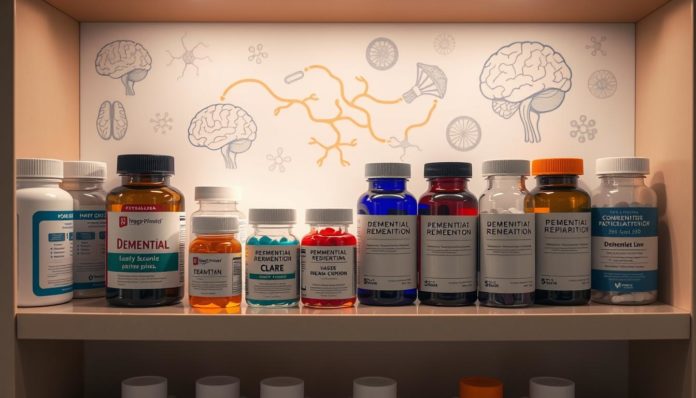Did you know almost 50 million folks globally are facing dementia? While no cure exists yet, there are medications that offer hope. They can slow down how fast the disease gets worse and help control symptoms.
In this detailed guide, we cover all you must know about managing dementia through medication. We’ll look into the newest treatments approved by the FDA and how to handle side effects. Our goal? To make life better for those fighting this hard battle.
Dementia Medications Overview
Dementia includes various brain conditions that affect millions around the world. It causes a decline in thinking and memory, making daily life hard for patients and their families.
Introduction to Dementia
Dementia covers a range of brain disorders that hurt memory, thinking, and social skills. Knowing about the dementia medication list is key. It shows the treatment options we have.
What is Dementia?
Dementia is a term for several conditions that reduce mental function badly enough to affect daily activities. It usually happens because of brain cell damage. This damage hurts the cells’ ability to communicate.
Importance of Medications in Managing Dementia
Medicines are vital for treating dementia. They aim to slow down the disease and lessen symptoms like memory loss. With various dementia medication options, patients and caregivers can handle everyday tasks better.
Talking openly with doctors before starting any treatment is key. Also, experienced clinicians must monitor the use of these medicines. This makes sure they are safe and work well. Here’s a simple picture to show this:

A specific list of medicines for dementia can greatly improve managing the illness. It brings hope and clear direction to many families dealing with this tough time.
Types of Dementia Medications
Dementia medications play a key role in managing the condition. They can ease symptoms and may slow the disease’s progression. Knowing about these medications is essential for patients and caregivers.

Cholinesterase Inhibitors
Cholinesterase inhibitors are widely used for dementia. They keep acetylcholine, a key chemical for memory, from breaking down. This action can improve nerve cell communication. For instance, Donepezil (Aricept®), Rivastigmine (Exelon®), and Galantamine (Razadyne®) are some cholinesterase inhibitors.
Glutamate Regulators
Glutamate regulators target glutamate, a neurotransmitter important for memory. Too much glutamate can harm nerve cells. A known glutamate regulator is Memantine (Namenda®), which helps shield brain cells by managing glutamate’s effects.
Combination Medications
Some patients may benefit from both cholinesterase inhibitors and glutamate regulators. Donepezil and Memantine (Namzaric®) combine these approaches. They target different dementia mechanisms, offering symptomatic relief and possibly improving brain function across dementia stages.
| Medication Type | Examples |
|---|---|
| Cholinesterase Inhibitors | Donepezil (Aricept®), Rivastigmine (Exelon®), Galantamine (Razadyne®) |
| Glutamate Regulators | Memantine (Namenda®) |
| Combination Medications | Donepezil and Memantine (Namzaric®) |
FDA-Approved Dementia Medications
In recent years, there have been big steps in dementia treatment. New FDA-approved medications offer hope to patients and their families. These drugs aim to fight the root causes of dementia, hoping to change its course. They also seek to ease the tough symptoms.
Aducanumab (Aduhelm®)
Aducanumab, or Aduhelm®, is a first of its kind FDA-approved therapy. It attacks and clears out amyloid-beta plaques in the brain. These plaques are linked to Alzheimer’s. Given through IV, it shows promise in slowing the loss of thinking skills in early Alzheimer’s patients.
Donanemab (Kisunla™)
Donanemab, known as Kisunla™, is a revolutionary FDA-approved drug. It, too, targets amyloid plaques but focuses on a specific type, N3pG. Studies show it can slow Alzheimer’s progress. It even lifts the spirits and life quality of those with the disease.
Lecanemab (Leqembi®)
Lecanemab, or Leqembi®, joins the latest FDA-approved dementia drugs. It targets early amyloid structures to halt plaque build-up. Administered every two weeks, it marks major progress in battling Alzheimer’s.
Here’s a quick look at these FDA-approved treatments:
| Medication | Brand Name | Target | Administration | Benefits |
|---|---|---|---|---|
| Aducanumab | Aduhelm® | Amyloid-beta plaques | Intravenous infusion | Slows cognitive decline |
| Donanemab | Kisunla™ | Specific beta-amyloid (N3pG) | Intravenous infusion | Improves quality of life |
| Lecanemab | Leqembi® | Protofibrils | Bi-weekly intravenous infusion | Prevents amyloid formation |
By focusing on different amyloid plaque processes, these new drugs bring hope. They could change Alzheimer’s future.
Medications for Cognitive Symptoms
The best dementia medications can greatly better the lives of those with dementia. Let’s examine three well-known drugs: Donepezil, Rivastigmine, and Galantamine.
Donepezil (Aricept®)
Donepezil is a top medicine under the name Aricept®. It boosts acetylcholine, crucial for memory and learning. While generally safe, it might cause nausea and diarrhea. Doctors can help manage these side effects.
Rivastigmine (Exelon®)
Rivastigmine goes by Exelon® and improves memory, thinking, and language. It’s one of the top medicines and comes in pills or patches. Side effects like vomiting and weight loss might occur but are typically manageable.
Galantamine (Razadyne®)
Under Razadyne®, Galantamine is another excellent pick for dementia symptoms. It increases acetylcholine and works on nicotinic receptors to boost brain function. Side effects might be dizziness and stomach issues but can be managed with medical advice.
Though not a cure, these medicines bring hope. They enhance cognitive functions and improve life for those with dementia.
Dementia Medication Side Effects
Dementia medications are key in managing symptoms. Yet, it’s crucial to know their potential side effects. Understanding these helps reduce risks and ensures a balanced treatment approach.
Common Side Effects
The usual side effects from dementia medications can include:
- Nausea
- Headaches
- Dizziness
- Diarrhea
- Loss of appetite
Serious Side Effects
Some serious side effects are rare but important to know about. They can include:
- Amyloid-Related Imaging Abnormalities (ARIA)
- Increased risk of heart problems
- Severe allergic reactions
Managing Side Effects
To manage side effects well, watch closely and talk often with healthcare providers. Adjustments can be made based on individual needs, including genetic factors. Let’s explore strategies for handling side effects:
| Side Effect | Management Strategy |
|---|---|
| Nausea | Take medication with food, consider anti-nausea medication |
| Headaches | Over-the-counter pain relievers, hydration |
| Dizziness | Avoid sudden movements, ensure hydration |
| Diarrhea | Stay hydrated, consider anti-diarrhea medication |
| Loss of appetite | Small, frequent meals, nutritional supplements |
| ARIA | Regular MRI scans, dosage adjustments |
| Heart problems | Regular cardiovascular monitoring, dosage adjustments |
| Allergic reactions | Immediate medical attention, switching medication |
Always work with healthcare experts to create a plan that suits your health. This helps lower risks from dementia medication side effects.
Latest Dementia Medications
The way we handle dementia medication is rapidly changing. New treatments have been approved. Additionally, ongoing clinical studies are introducing more advanced options.
Recent Approvals
The FDA recently approved new medicines for dementia. Drugs like Aducanumab (Aduhelm®), Donanemab (Kisunla™), and Lecanemab (Leqembi®) are quite promising. They target beta-amyloid in the brain to slow down cognitive decline. This brings new hope for those living with dementia.
Ongoing Clinical Trials
Currently, there are many clinical trials underway. They aim to find more effective treatments for dementia. These trials are exploring innovative therapies that might offer better results and fewer side effects. For anyone involved in dementia medication management, keeping up with these trials is vital. For more information, check out this comprehensive guide.
Future Prospects
The outlook for managing dementia medications looks promising. With various advancements on the way, new therapies could soon improve how we manage symptoms and enhance life quality. Staying informed about future developments can aid in making better treatment choices.
Non-Cognitive Symptoms Management
Managing non-cognitive symptoms is vital in dementia care. These include sleep issues and behavioral changes, affecting the life quality of patients and caregivers. Using certain medications and non-drug methods can reduce these symptoms.
Suvorexant (Belsomra®)
Suvorexant, or Belsomra®, targets dementia-related insomnia. It enhances sleep, reducing nighttime restlessness and improving daytime activity. Yet, it’s important to watch for side effects like drowsiness or balance problems.
Atypical Antipsychotics
Atypical antipsychotics help control dementia-related behaviors such as aggression. Though effective, their risks must be weighed carefully. These medications could increase the chances of stroke or heart issues. So, combining them with non-medical strategies and regular check-ups is advised for safe symptom management.
Who Benefits from Dementia Medications?
Finding the best dementia medications is key for those with dementia. The type and stage of dementia affect how well meds work. Each patient gets a dementia medication list made just for them.
Dementia meds can greatly help some people. They may see better brain function, making everyday life easier and happier. But, benefits can be small for others. This shows why meds must fit the person’s needs.
Let’s explore how dementia type and stage affect benefits:
| Dementia Type | Possible Benefits | Medications Used |
|---|---|---|
| Alzheimer’s Disease | Improved memory, thinking skills | Donepezil, Memantine |
| Lewy Body Dementia | Enhanced attention, reduced hallucinations | Rivastigmine, Donepezil |
| Vascular Dementia | Better executive function | Galantamine, Memantine |
| Parkinson’s Disease Dementia | Lessened cognitive fluctuations | Rivastigmine, Donepezil |
The table above shows how important it is to check the meds often. Doing so makes sure the best dementia medications match up with what each patient needs. This helps the dementia medication list stay right for the patient over time.
Special Considerations for Different Dementia Types
Understanding the specific type of dementia a patient has is key. Each type needs a unique approach to treatment. The choice of medication is vital in this custom care. It ensures the treatment works well and life quality improves for those affected.
Alzheimer’s Disease
Alzheimer’s Disease is very common in dementia patients. It often responds to cholinesterase inhibitors like Donepezil (Aricept®) and Rivastigmine (Exelon®). Memantine (Namenda®), a glutamate regulator, is also used. These drugs can ease symptoms and may even slow the disease progression.
Regular check-ups with healthcare providers are important. They ensure that the medication dose and mix are just right for the best results.
Dementia with Lewy Bodies
Dementia with Lewy Bodies (DLB) needs a different treatment plan than Alzheimer’s. Some cholinesterase inhibitors might help. But, drugs like atypical antipsychotics often work better for symptoms like hallucinations and sleep problems. Watching out for side effects is crucial because DLB is a sensitive condition.
Parkinson’s Disease Dementia
Parkinson’s Disease Dementia (PDD) is similar to DLB but needs its own treatment strategy. Drugs used for PDD often include cholinesterase inhibitors and Levodopa for motor symptoms. The approach to treatment must balance cognitive and motor symptoms. It should be personalized for the best patient outcomes.
In conclusion, understanding and choosing the right dementia medications is critical. It’s all about personalized care. Custom treatments for different types of dementia lead to better symptom management. They also improve the quality of life for patients.
FAQ
What are the best dementia medications available?
Donepezil (Aricept®), Rivastigmine (Exelon®), and Galantamine (Razadyne®) top the list for dementia meds. They’re mainly used for Alzheimer’s and similar diseases. They help manage mental symptoms well.
What options are there for dementia medication management?
Managing dementia meds includes meeting with doctors regularly and watching for side effects. The care plan is tailored to each patient. It’s vital to make sure the meds work safely.
What types of dementia medications are available?
We have cholinesterase inhibitors and glutamate regulators, among others. Each targets different disease aspects. They aim to control symptoms and slow down the disease.
What should be included in a dementia medication list?
A dementia medicine list should have Donepezil, Rivastigmine, Galantamine, and others. Always check with a doctor for a list that fits your needs.
What are the latest FDA-approved dementia medications?
The newest meds approved include Aducanumab (Aduhelm®), Donanemab (Kisunla™), and Lecanemab (Leqembi®). They focus on clearing brain plaques. Early Alzheimer’s patients might see disease slowdown with these.
What are common side effects of dementia medications?
Nausea, headaches, and dizziness are typical side effects. Tell your doctor about any side effects to get the right help.
What are serious side effects associated with dementia medications?
Major side effects include ARIA and higher heart risks. A healthcare professional must assess and monitor these risks.
How can side effects from dementia medications be managed?
Deal with side effects through regular doctor visits and tweaking the dosage. Sometimes, you may need to switch meds. Every treatment is based on personal reactions.
What are some of the recent dementia medications approved?
The latest drugs approved for dementia are Aducanumab, Donanemab, and Lecanemab. They work on reducing harmful brain plaques. These drugs are promising for those in early stages.
Are there ongoing clinical trials for dementia medications?
Yes, lots of clinical trials are happening for new dementia drugs. These trials are key to discovering better treatments or even a cure.
How should non-cognitive symptoms like sleep disturbances and agitation be managed?
To handle symptoms like insomnia or agitation, some meds can help. But balancing drug and non-drug strategies is crucial. Always monitor for adverse effects.
Who benefits most from dementia medications?
People in the early to middle stages of dementia see the most benefit. Treatments must be personalized, considering the dementia type and stage.
What special considerations are there for different types of dementia?
Treatment depends on the dementia type. Alzheimer’s might respond well to certain drugs. But Lewy Bodies Dementia and Parkinson’s Disease Dementia need other approaches for unique symptoms.


